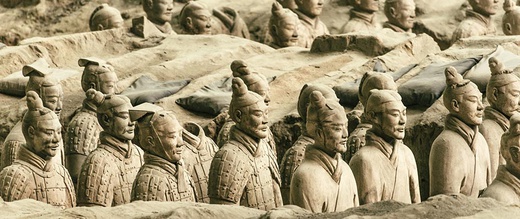The views expressed in our content reflect individual perspectives and do not represent the authoritative views of the Baha'i Faith.
I love philosophy—it elevates the mind, leads to noble thoughts and stokes the fires of curiosity.
If you want to know more about philosophy, though, you could easily make it a lifetime pursuit. Just reading the ancient Greek philosophers and trying to understand their wisdom could take several decades of devoted full-time study, not to mention trying to take in and comprehend the great philosophical works that came out of Buddhism, Judaism, Christianity, Islam and many other traditions. The modern philosophers have an enormous amount to offer, too—in fact, you’d need several lifetimes of serious work to digest all things philosophical. So here’s a way I’ve discovered to make philosophy a little more accessible: take a look at the philosophy-related websites and publications from the world’s major universities.
Oxford, Harvard, Stanford and many other well-known academic centers have done the work and put in the time to understand the arc of human philosophy and explain it in a digestible, rational way. One of my favorite sites, for example is the Stanford Encyclopedia of Philosophy. I’ve learned a great deal from this particular website, and often recommend it to fellow philosophy geeks. The other day, though, reading along on that website, I came across something I disagreed with immediately and immensely, written by a Marxist historian:
History consists of human actions within humanly embodied institutions and structures. There is no super-human agency in history. There is no super-human meaning or progress in history; there is only a series of events and processes driven by concrete causal processes and individual actions. – Philosophy of History, Stanford Encyclopedia of Philosophy 2016.
As a Baha’i, I disagree strongly, because I believe that the Creator has played, and continues to play, a major role in human history. Do you?
Just about anyone with any religious or mystical or spiritual convictions at all probably feels the same way. So it’s hard for me to imagine how anyone familiar with the long arc of philosophical inquiry can completely dismiss any “super-human agency” from the entire sweep of human history. The thought, in fact, struck me as enormously egotistical when I read it.
To believe in that premise, I suspect, you would have to attribute the founding of every Faith to a single merely deluded or deranged human being, who then preceded to establish a religion that went on to delude millions of other people over the ensuing millennia. Did Christ, for example, through the force of his personality or his charisma, simply mislead billions of his followers who became Christians—and did they then have no impact on the history of humanity? How is that even possible?
Don’t get me wrong, though—I’m not arguing that God directs every aspect of human history. We humans need to take responsibility for it, too. Realistically, we know that one of the most powerful forces in human history—religion—has not always produced positive results. In fact, decaying religious institutions have produced some of the worst results imaginable:
The religions of the past have fallen into decay on account of self-seeking leaders who in the course of time appropriated all the rights and powers unto themselves and looked down contemptuously upon the rest of their co-religionists as ignorant and deprived of the knowledge of God. – Abdu’l-Baha, Star of the West, Volume 4, p. 180.
That which was meant to be conducive to life has become the cause of death; that which should have been an evidence of knowledge is now a proof of ignorance; that which was a factor in the sublimity of human nature has proved to be its degradation. Therefore, the realm of the religionist has gradually narrowed and darkened, and the sphere of the materialist has widened and advanced; for the religionist has held to imitation and counterfeit, neglecting and discarding holiness and the sacred reality of religion. – Abdu’l-Baha, The Promulgation of Universal Peace, p. 179.
Alas, that the foundation of reality has disappeared and imitations, customs and ceremonies that are the foundation of dissension, the cause of obstinacy, the means of war and struggle have appeared. The original purpose of the appearance of the Holy Manifestations and the establishment of the divine teachings have passed away …. When thou considerest truth or reality thou wilt see that these old and decayed limitations in religion become the cause of bloodshed among the people and the nations. – Abdu’l-Baha, Star of the West, Volume 5, p. 135.
So we know that human beings, as the Stanford Philosophy Encyclopedia implies, definitely do have a significant amount of agency and influence in the world. We can take responsibility for much good, and much bad, too. However, the fact that humans have free will does not, the Baha’i teachings say, remove God from the equation:
… every time the Prophets of God have illumined the world with the resplendent radiance of the Day Star of Divine knowledge, they have invariably summoned its peoples to embrace the light of God through such means as best befitted the exigencies of the age in which they appeared. They were thus able to scatter the darkness of ignorance, and to shed upon the world the glory of their own knowledge. It is towards the inmost essence of these Prophets, therefore, that the eye of every man of discernment must be directed, inasmuch as their one and only purpose hath always been to guide the erring, and give peace to the afflicted…. – Baha’u’llah, Gleanings from the Writings of Baha’u’llah, pp. 80-81.
Most historians understand that every new civilization has its birth in a new religion, and that each new religion emerges because a new prophet or messenger of God appears, bringing that new religion to humanity. The Baha’i teachings base their entire theory of history on this evident process.
In the next essay in this series, in our quest to understand the larger forces that drive human history, we’ll look at how to determine whether any of the great sages, philosophers and teachers was, in reality, a prophet of God.

















Comments
Sign in or create an account
Continue with Facebookor